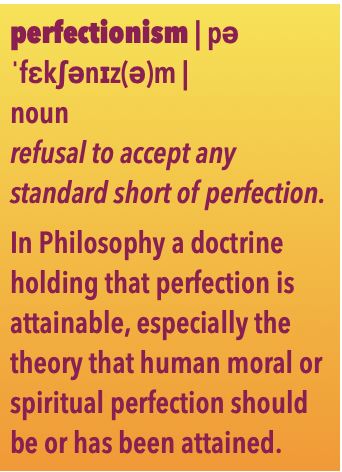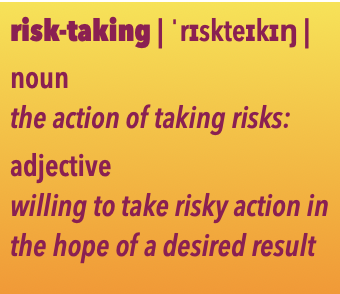Drama Tuesday - Making mistakes and taking risks
/Challenging perfectionism
We live in a world that sometimes sets us up for failure.
We see on social media Instagram Perfect Classrooms. We are told to strive for the best. Sometimes my university students are reluctant to submit their assignments because they are afraid that they are not “perfect”, not yet “as good as it is possible to be” (or read the subtext, I won’t get an HD!).
With some of these ideas in mind, I am presenting a paper workshop at the Singapore Drama Educators Conference in a few days. I am challenging the urge to be the perfect drama teacher.
The title: Mistakes, I’ve made a few. Reflection, Reflexivity and Drama Teaching
The proposal.This presentation/ workshop invites you to share stories of your memorable drama teaching moments as the basis of focusing on the role of reflection in drama teacher education.
Through the shared stories, we will explore the learning involved through processes of structured personal reflection. We will explore using Critical Incident Methodologies (Tripp, 1993/2012), case stories (Norris, McCammon, & Miller, 2000) as reflective tools for drama teacher education. The necessity of articulating Theoretical Frameworks for effective reflection and reflexive practice will be key outcomes.
This will provide an opportunity to consider approaches to drama teacher education: apprenticeships, mentored partnerships, university-based courses, and alternatives provided on-line or by associations.
The workshop is an invitation to share in a Community of Practice.
There’s a line in an old song that goes “mistakes I’ve made a few”. The line continues, “but then again, too few to mention!”
In my drama, teaching, I’m afraid the added line isn’t quite true.
One of the things that I could honestly say to my drama education students was that when it comes to drama teaching, I am able to speak from experience from the mistakes I’ve made. I don’t say that to beat myself up, but I do say it to indicate that it is important in drama teacher education to learn from our mistakes.
I heard about this idea of T-I-R Teacher in Role. I thought it would be easy. Without warning or preparation I launched into the role of a drill sergeant (modelled on my own school experiences of army cadets.
My poor year 10 students, ever compliant and ever hopeful, did their best. But the experience I offered was so far removed from their imagined and real worlds that the lesson limped along to a sagging conclusion. The activity had no specific purpose or connection to the lives of these students in a different time, place and school culture. What on earth was I thinking!
That of course is not the end of the story. Like every good teacher, I spent time thinking, reflecting, and doing something differently.
Peter Duffy (2015), initiated one of the books that he edited with the provocation to experienced drama educators: what was I thinking? This brought forth a succession of shared stories of drama teaching. Each of them have an insight into the thought processes, what Morgan and Sexton (1989) usefully called DramaThink.
In this workshop, you are invited to share your ‘’drama mistakes.‘’. Not in a mea culpa way but to stimulate reflection and reflexivity.
What are your “mistakes” in drama teaching?
Risk taking
In life we often advise people to avoid risk where risk is seen as something dangerous and potentially harmful. It’s risky to play with fire or to climb too high in the tree.
In drama we talk about physical risk and psychological risk. We do what we can to prevent students pushing each other around the drama room while they are on top of the lighting scaffold. We advise students to avoid negatively criticising other student performances or disclosing personal and private information.
Yet, it is important to also recognise that sometimes in drama teaching we have take risks in the sense of stepping into something that is new of different, trying something where the outcome is uncertain.
In this sense Risk Taking is a component of the decision-making process in situations that involve uncertainty and in which the probability of rewards and/or negative consequences are unknown. (Front. Psychol., 08 March 202. Sec. Personality and Social Psychology. Volume 12 - 2021. https://doi.org/10.3389/fpsyg.2021.562381)
In this sense, mistakes then are less failures and more risk taking with potential for learning fore future practice.
When are you a risk taker in drama teaching?
How do we slay the fiery dragon of perfectionism?
We are all human and that is what we must celebrate.
I am publishing the slides from this presentation alongside this post. You can find them here.
Bibliography
Duffy, P., Ed. (2015). A Reflective Practitioner's Guide to (Mis)Adventures in Drama Education - or - What Was I Thinking?, Intellect.
Morgan, N. and J. Saxton (1989). Drama: A Mind of Many Wonders, Nelson Thornes.
Norris, J., L. A. McCammon and C. S. Miller (2000). Learning To Teach Drama: A Case Narrative Approach. Portsmouth, Heinemann Drama.
Tripp, D. (1993/2012). Critical Incidents in Teaching: Developing Professional Judgement. Abingdon, Oxon, Routledge.








